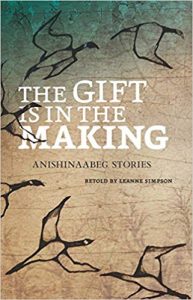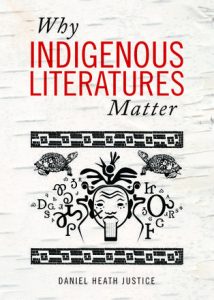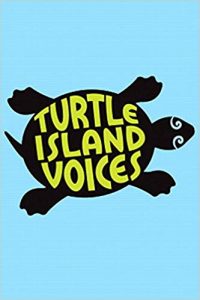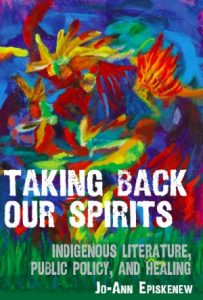This month’s Indigenous display is focused on Indigenous Literatures and Storywork. All of the books in the display were written and curated by writers with the firm belief that stories have the power to effect personal, political and social change. These stories are used by Indigenous writers to imagine and engage with different relationships between the communities, land, history, family, and other individuals. Below are a few selections from the display. If you’d like to check out books from this display you can do so by visiting the Ground Floor Display of OISE Library (across from the New Titles shelf) and taking out the books.
 The Gift is In the Making is a collection of 21 tales from the Nishnaabeg storyteller Leanne Betasamosake Simpson. Her purpose for the compiling these stories was “to liberate a few of them from the colonial contexts in which they are too often documented – in which we see the marginalization and subjugation of female characters and spirits, a focus on hierarchy and authoritarian power, and an overly moral and judgmental tone.” The collected stories in the book are also surrounded by full-page illustrations which widen the scope of the storytelling throughout the book. This book is recommended for students age 9 – 15 or grades 4-9.
The Gift is In the Making is a collection of 21 tales from the Nishnaabeg storyteller Leanne Betasamosake Simpson. Her purpose for the compiling these stories was “to liberate a few of them from the colonial contexts in which they are too often documented – in which we see the marginalization and subjugation of female characters and spirits, a focus on hierarchy and authoritarian power, and an overly moral and judgmental tone.” The collected stories in the book are also surrounded by full-page illustrations which widen the scope of the storytelling throughout the book. This book is recommended for students age 9 – 15 or grades 4-9.
 Why Indigenous Literatures Matter is described as “part survey of the field of Indigenous literary studies, part cultural history, and part literary polemic.” This book is an extremely important resource that reflects on the connections between literature and lived Indigenous experiences. Furthermore, it also works as a tremendous resource for those who are trying to explore Indigenous writing as it provides an encyclopedic appendix at the end that speaks to the canon of Indigenous literature that has always existed—even if obscured by colonial history. It also asks readers to reflect on their own assumptions when the engage with Indigenous literature and stories at large. This book is written for both general readers as well as for specialists who have certain topics of interest in the field.
Why Indigenous Literatures Matter is described as “part survey of the field of Indigenous literary studies, part cultural history, and part literary polemic.” This book is an extremely important resource that reflects on the connections between literature and lived Indigenous experiences. Furthermore, it also works as a tremendous resource for those who are trying to explore Indigenous writing as it provides an encyclopedic appendix at the end that speaks to the canon of Indigenous literature that has always existed—even if obscured by colonial history. It also asks readers to reflect on their own assumptions when the engage with Indigenous literature and stories at large. This book is written for both general readers as well as for specialists who have certain topics of interest in the field.
 Turtle Island Voices is a curriculum resource that shares the histories, perspectives and stories of First Nations, Métis and Inuit communities across Canada. The book is written in a way that encourages students to respond and engage with the stories by sharing their own stories and perspectives with one another. This book is also aimed at slowly improving the literacy of students by doing activities such as answering questions about the themes discussed in the stories, or including sentence starters. The activities and stories are adjusted for different grades from Gr.1 – Gr. 6
Turtle Island Voices is a curriculum resource that shares the histories, perspectives and stories of First Nations, Métis and Inuit communities across Canada. The book is written in a way that encourages students to respond and engage with the stories by sharing their own stories and perspectives with one another. This book is also aimed at slowly improving the literacy of students by doing activities such as answering questions about the themes discussed in the stories, or including sentence starters. The activities and stories are adjusted for different grades from Gr.1 – Gr. 6
 Taking Back Our Spirit focuses on how different types of Indigenous literatures spanning from contemporary autobiographies, fictional works, drama and much more function as medicine that help heal individuals as well as their communities. This book traces back to how the earliest settler policies focused on dealing with the “Indian problem” and how the historical trauma of those public policies still impacts Indigenous peoples today. Episkenew identifies how undertaking different reading strategies can highlight how writing can be a tool for social justice. Some of the writers whose works she explores include Basil Johnston, Maria Campbell, Beatrice Culleton Mosionier and Richard Wagamese. This book is recommended for those interested in literary criticism.
Taking Back Our Spirit focuses on how different types of Indigenous literatures spanning from contemporary autobiographies, fictional works, drama and much more function as medicine that help heal individuals as well as their communities. This book traces back to how the earliest settler policies focused on dealing with the “Indian problem” and how the historical trauma of those public policies still impacts Indigenous peoples today. Episkenew identifies how undertaking different reading strategies can highlight how writing can be a tool for social justice. Some of the writers whose works she explores include Basil Johnston, Maria Campbell, Beatrice Culleton Mosionier and Richard Wagamese. This book is recommended for those interested in literary criticism.
